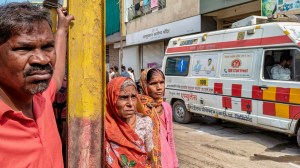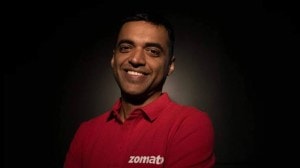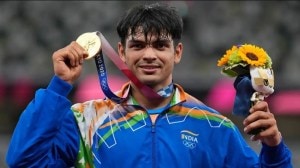Be prepared for a Bush
Put it down to traditional Indian hospitality, that Chelsea Clinton's college vacation will be taken into account when dates are finalised...

Put it down to traditional Indian hospitality, that Chelsea Clinton8217;s college vacation will be taken into account when dates are finalised for the US President8217;s visit towards the end of March. That is something we can do. What we cannot do, alas, is to coax that elusive national consensus which is an absolute pre-requisite before the CTBT can be signed.
Of course, US interlocutors will argue: quot;by not signing the treaty you are letting Pakistan off the hookquot;. Will you kindly explain to us this convoluted logic?
quot;Didn8217;t you see how tough Assistant Secretary of State Karl Inderfurth was with Gen Musharraf?quot; the interlocutors will continue. quot;Inderfurth gave the Pakistanis a clear check list of the number of things Islamabad had to do before Clinton makes up his mind on whether or not to include Islamabad on his itinerary 8211; signing of the CTBT, ending links with terrorism, movement towards democracy are items at the top of this list. By not signing the CTBT, New Delhi will have furnished Islamabad with anexcuse not to sign too. New Delhi will thus help remove an obstacle in the way of Clinton8217;s visit to Islamabadquot;.
This is simply to give you a flavour of conversations one has recently had in American circles close to the strategists at the National Security Council. This discussion would have had some validity over two months ago when the government had initiated a national debate on the CTBT with a clear intention to create a consensus for signing the treaty.
At that stage important scientists involved with Pokharan II were willing to certify that the country had obtained enough data not to require any more tests quot;for the next ten years or soquot;. This quot;10 years or soquot; was the time limit in the context of the anticipated security environment as it was likely to evolve in the decade ahead. But, there were, among the scientists, those who were agnostics on this count too.
The arcane and the technical aspects of the nuclear debate apart, there was a growing body of people questioning the tactics of handingover the nuclear card to a US President who would soon be a lame duck. On current showing the next US administration would be in Republican hands. What sort of access do we have to Governor Bush, for instance? Are we about to make the same mistake in Washington that we made in London? So completely identified was the High Commission with the Conservatives that the next High Commissioner, Lalit Mansingh, had to do monumental repair job with the new Labour administration in Britain.
There is a very influential Indian community with strong Republican connections. Have they been mobilised? Have we identified the foreign policy elements that are likely to man the State Department, Pentagon and the National Security Council? Have we spoken to them?
Every visiting head of state finds time to call on Sonia Gandhi. Surely, Jaswant Singh, Brajesh Mishra and sundry others who travel frequently for the national purpose can engage Americans who are likely to occupy key positions in a future US administration.
Thisline of thinking is dismissed by American friends of India currently close to the Clinton administration. quot;Grab whatever is coming your wayquot;, they suggest. quot;A bird in hand is worth two in the Bushquot;. The implication is that the next Republican administration a pity no one is giving Al Gore much of a chance at least at this stage will fashion its own priorities.The architecture of a new strategic partnership with India the Clinton administration has embarked on will fall into neglect.
It is a fact that the comprehensive dialogue Jaswant Singh has had with Strobe Talbott, spread over nine, extensive sessions marks a historic turning point in Indo-US relations. Considering that every Secretary of State in recent years Warren Christopher or Madeline Albright has primarily been Secretary of State for the Middle East, Strobe Talbott was the highest official Clinton could have appointed to dedicate himself to the new saliency that was being accorded to the Indo-US axis.
It is argued that the Clinton visitwill bring this sequence of very important discussions to a climax. The visit will be the icing on the cake.The counter-argument is that the visit would have been the quot;icing on the cakequot; if Clinton was coming only to New Delhi. When President Chirac of France visited India, New Delhi and Bombay were his only destinations. It is another matter that when the Prime Minister made the return visit, he dropped in at Paris on his way from New York where he had received the usual treatment from the American President: audiences at the Waldorf Astoria with the Indian and Pakistani premiers with meticulous even handedness.
Even so, I suspect the CTBT may have been signed prior to the Clinton visit had the Indian Airlines hijack and a widespread perception that the Americans had been particularly unhelpful during the crisis not vitiated the atmosphere. Home Minister L.K. Advani and others were extremely angry at being let down by the Americans. They had given the Home Minister a firm commitment that the aircraft willnot be allowed to take off from Dubai.
Had Ambassador Richard Celeste not rushed to the Home Ministry with his explanations the pilot had panicked and taken off, the President8217;s visit itself might have been in jeopardy.
The divisions within the BJP at one stage it was the Prime Minister and Jaswant Singh versus the rest got aggravated after the hijack to such a point that it became politically difficult to give continued support to what was increasingly seen as the Foreign Minister8217;s project. This perception too was faulty because Singh, though convinced of the advantages of signing the CTBT, was averse to the propaganda gaining ground that the signature was being contrived only because the President was coming.
Not just the CTBT, but all manner of understanding with the US is possible provided there is evidence that Washington will do the following: lean on Pakistan till it disengages itself from transborder terrorism and sits down with India to discuss all issues including Kashmir. It must not beforgotten that Kashmir is part of the internal politics of both India and Pakistan.
The issue, therefore, cannot be addressed so long as Pakistan keeps up the temperature on that subject. Washington has the levers to persuade Pakistan to desist. This Washington can and must do for a lasting engagement with India and the subcontinent. In that framework, obstacles like CTBT will become easily surmountable.
- 01
- 02
- 03
- 04
- 05































